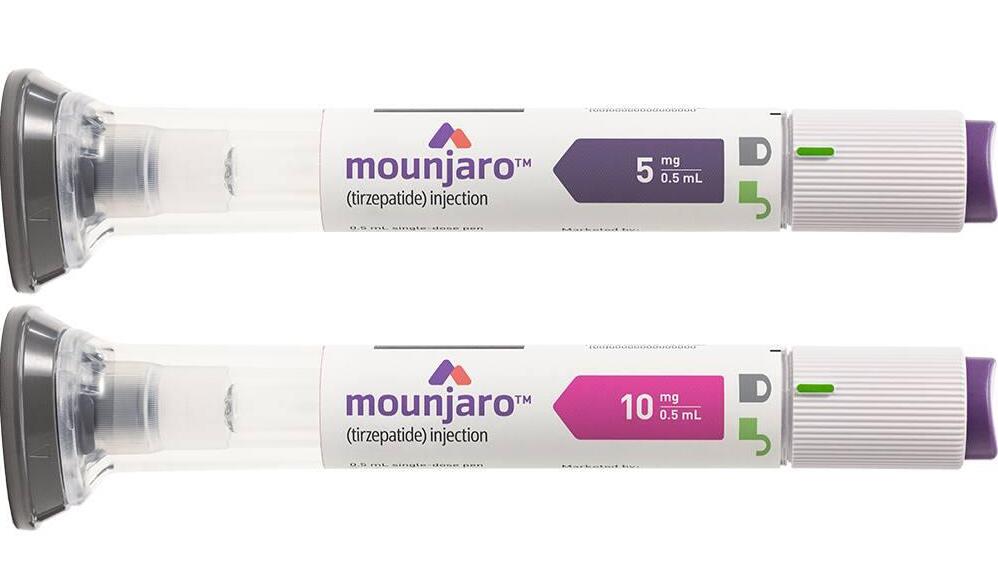A new study by Eli Lilly, published on Tuesday night, showcases the remarkable efficacy of the drug Tirzepatide (also known as Mounjaro) in significantly reducing the risk of progression to type 2 diabetes among adults with prediabetes and obesity or overweight.
The study revealed an impressive 94% reduction in the risk of moving from prediabetes to type 2 diabetes for those treated with Tirzepatide compared to a placebo group. This breakthrough not only provides hope for patients and individuals struggling with obesity but also has invigorated investors; for example, U.S. pharmaceutical company Eli Lilly's stock rose by 3% on Wall Street.
The research demonstrated that Mounjaro treatment led to sustained weight loss over the duration of the 176-week study. Participants receiving a 15 mg dose experienced an average body weight reduction of 22.9%, compared to only 2.1% in the placebo group. The study involved 1,032 adults with prediabetes and obesity or who were overweight, and its complete findings will be published in a scientific journal and presented at ObesityWeek 2024.
Mounjaro is approved by the Ministry of Health for treating type 2 diabetes and is anticipated to be available in Israel soon. The drug has been submitted for approval to treat obesity.
Dr. Roy Eldor, head of the diabetes unit at Sourasky Medical Center, emphasized that "Tirzepatide is approved in the U.S. for treating both obesity and diabetes, showing unprecedented results in diabetes treatment compared to any other drug. It has also shown remarkable weight loss outcomes." He added that the drug "has been submitted to the medical services basket this year, and we hope it will be approved and distributed in Israel soon."
Dr. Eldor noted that: "For individuals with obesity, diabetes is a complication. Treating obesity can prevent its complications. The more effective medications we have for treating obesity, the better we can prevent its numerous complications."
He further highlighted that "the study results indicate that even with more than three years of follow-up, there is still a maintained weight loss of over 22% with a high dosage. Additionally, the study shows a 94% prevention of diabetes onset. Modern medicine certainly favors disease prevention over treatment, and if we can prevent a disease, we can also avoid all its complications."
Dr. Lior Neuman, a family medicine and diabetes and obesity specialist, explained that the update released on Tuesday pertains to follow-up results from the SURMOUNT1 study.
"This study evaluated the efficacy and safety of the active ingredient Tirzepatide as an adjunct therapy for weight loss, alongside diet and exercise. It included about 2,500 participants with obesity or overweight with complications like hypertension, cholesterol disorders and/or sleep apnea, randomly divided into two groups (medication versus placebo) and lasted slightly over a year," he explained.
"The phase three results of this study were published in the professional literature over two years ago, leading to the FDA's approval of the drug ZEPBOUND, which contains the same active ingredient, as a standard treatment for obesity," Neuman added. "Now, Eli Lilly is releasing data for approximately 1,000 participants from the original study population who were diagnosed with prediabetes at the study's start. This subgroup continued the study for an additional two years to assess the long-term effects of Tirzepatide on the progression from prediabetes to type 2 diabetes and body weight compared to placebo."
Regarding the study results, he noted that "the impressive data reinforces the drug's long-term efficacy, both in maintaining weight loss and delaying the progression to type 2 diabetes." He mentioned, "The safety profile of the drug was similar to previously reported data – participants mainly experienced gastrointestinal side effects such as diarrhea, constipation, nausea and vomiting, typically mild to moderate in intensity."
On the drug's availability in Israel, he added, "Tirzepatide is already registered in Israel for obesity treatment, but it has not yet made an official debut in the country. Eli Lilly has not announced when exactly the drug will be available in Israeli pharmacies, but it is expected to take a few months at least. Currently, the most available and effective drug in Israel for obesity treatment is Wegovy, produced by the Danish pharmaceutical company Novo Nordisk."
Neuman explained the differences between Tirzepatide and Semaglutide, the active ingredient in the weight loss injection Wegovy and the type 2 diabetes treatment Ozempic, stating that "both drugs are administered via weekly subcutaneous injection. ZEPBOUND (containing Tirzepatide) is marketed in the U.S. in doses of 5, 10, and 15 mg, while Wegovy is marketed in five doses ranging from 0.25 mg to 2.4 mg (the researched and recommended dose).
"In terms of biological mechanism, both affect the brain and reduce appetite, leading to decreased caloric intake and weight loss. However, Tirzepatide binds not only to the GLP-1 receptor but also to the GIP receptor, likely accounting for its slightly higher efficacy compared to Wegovy, resulting in an average weight loss of 15% after two years, according to the STEP5 study," he added.
Regarding the progression to type 2 diabetes, "Wegovy also demonstrates a similar inhibitory effect, with 85% of patients achieving normoglycemia (normal blood sugar levels) after one year of treatment, compared to only 48% in the placebo group (according to the STEP1 study). The side effect profiles of both drugs are quite similar, and their prevalence among patients is more or less the same.
"Unfortunately, neither drug is included in the national health registry, and they cannot yet be purchased through the supplementary insurance of health funds, only privately. The price of Wegovy can be up to $335, and we do not have data on the future price of Tirzepatide, which will likely be marketed in Israel under the name 'Mounjaro' for both type 2 diabetes and obesity treatment."





